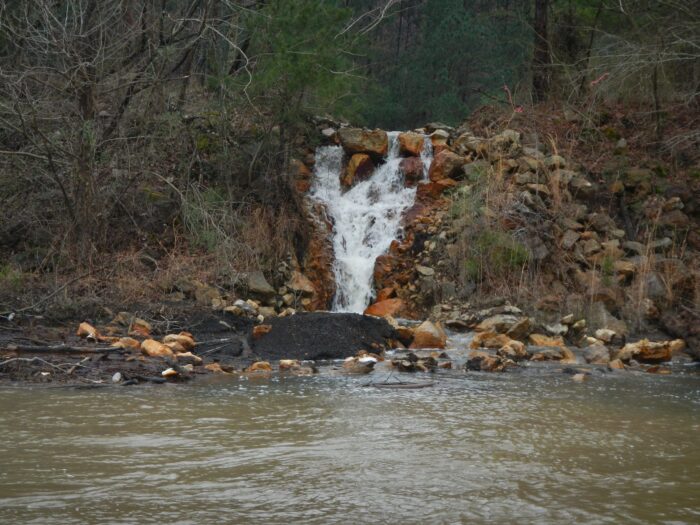Filing will force cleanup of Drummond’s Maxine Mine site
In a major victory for the health of the Black Warrior River, we just lodged a proposed consent decree in federal court that, if approved, will finally force Drummond Company to clean up its abandoned Maxine Mine site.
“The rulings in this case and the consent decree itself are critical to protecting the Black Warrior River from harmful legacy impacts of coal mining—and set a precedent for polluters throughout Alabama that these type discharges violate federal law,” says Director of Southern Environmental Law Center’s Alabama Office Barry Brock. “Site owners must take accountability for harming communities’ clean water.”
SELC filed the consent decree with Public Justice on behalf of Black Warrior Riverkeeper following more than five years of litigation to compel Drummond to stop discharges of acid mine drainage from a massive six-million-cubic-yard coal mine waste pile at the site near Praco.
The settlement is one large step in fighting the long-lasting legacy of coal mining.
Jim Hecker, Director of Public Justice’s Environmental Enforcement Project
Located on the banks of the Locust Fork of the Black Warrior River, the site has continued to discharge polluted water without a permit since mining operations ceased in the 1980s, harming an invaluable natural resource for residents across the state.
“We are happy with this historic outcome for the Locust Fork and everyone who loves to swim, fish, paddle, and boat on the river,” says Riverkeeper Nelson Brooke. “Maxine Mine’s acid mine drainage has polluted the Locust Fork for decades and it’s time the site is cleaned up to protect the health of the river and the people and wildlife who depend on it.”

Under the terms of the consent decree, Drummond must remediate the site to eliminate discharges of acidic drainage, including sediment, metals such as iron, manganese and aluminum, and other pollutants.
“The settlement is one large step in fighting the long-lasting legacy of coal mining,” says Jim Hecker, Director of Public Justice’s Environmental Enforcement Project. “Companies like Drummond must take responsibility for cleaning up acid mine drainage and runoff that continue to threaten streams and groundwater in the watershed. …The actions required by the decree show why citizen suits are a critical enforcement mechanism when governments fail to enforce the law.”
The consent decree specifies that Drummond must comply with pollution limits by a specified date, and that the new limits apply even if a less stringent permit is issued by the state. If Drummond fails to meet the final compliance deadline, the decree imposes penalties of $1,750 per day.
Drummond will also be required to set aside funds to maintain and operate treatment systems for at least 30 years. Finally, Drummond must pay $2.65 million in litigation costs and $1 million for a Supplemental Environmental Project to mitigate the effects of its past pollution in the Locust Fork watershed.
If approved by the court after a 45-day comment period by the U.S. Department of Justice, will force Drummond Company to clean up its abandoned Maxine Mine site.
